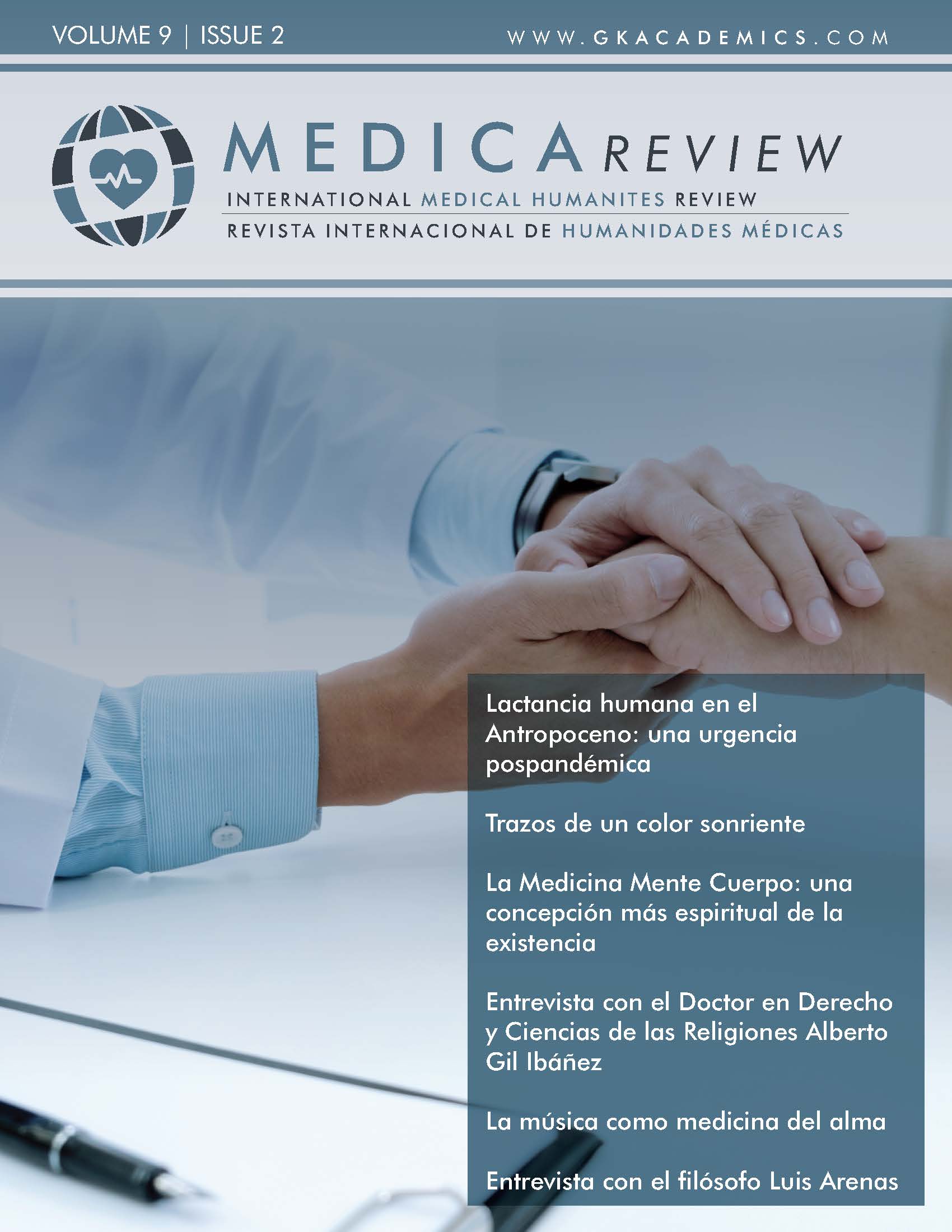La Medicina Mente Cuerpo: una concepción más espiritual de la existencia
DOI:
https://doi.org/10.37467/gkarevmedica.v9.3162Palabras clave:
Atención primaria en salud, Derecho a la salud, Medicina mente cuerpo, Técnicas mente cuerpo, EspiritualidadResumen
La salud como derecho fundamental de todos, consideración éticamente correcta, que se reafirma en las declaraciones de Alma-Ata y Astana, conceptuando la salud como un estado de bienestar físico, mental y social, y no solo la ausencia de enfermedad, estima la atención primaria en salud primordial para este fin, por lo que se realizó una revisión bibliográfica y un análisis crítico sobre los beneficios de las técnicas de la medicina mente cuerpo, como propuesta autosostenible que promueve la salud y previene la enfermedad, dando lugar a un espacio para el desarrollo de la vida espiritual.
Estadísticas globales ℹ️
|
192
Visualizaciones
|
197
Descargas
|
|
389
Total
|
|
Citas
Anderson, N., Johnson, S., Belar, C., Breckler, S., Nordal, K., & Ballard, D. (2012). Stress in America: Our Health at Risk. American Psychological Association.
Astin, J., Shapiro, S., Eisenberg, D., & Forys, K. (2003). Mindbody Medicine: State of the Science, Implications for Practice. J Am Board Fam Pract, 16, 131–147.
Barrows, K., & Jacobs, B. (2002). Mind-body Medicine. An Introduction and Review of the Literature. Med Clin North Am, 86, 11–31.
Bhasin, M. K, Dusek, J. A., Chang, B. H., Joseph, M. G., Denninger, J. W, Fricchione, G. L., Benson, H., & Libermann, T. A. (2017). Correction: relaxation response induces temporal tran- scriptome changes in energy metabolism, insulin secretion and inflammatory pathways. . PLoS One, 12(2), e0172873.
Chrousos, G., & Gold, P. (1992). The concepts of stress and stress system disorders. Overview of physical and behavioral homeostasis. JAMA;267(9), 1244–52.
Coburn, E. (2005). Meditation in psychotherapy. Hardvard Mental Health Letter, 10, 1-5.
Conferencia Internacional sobre Atención Primaria de Salud. (1978). Declaracion de Alma-Ata. PHO.
Cornah, D. (2006). The impact of spirituality on mental health. A review of the literature. Mental Health Fundation .
Dusek, J., & Herbert, M. (2009). A Model of the Comparative Clinical Impact of the Acute Stress and Relaxation Responses. Minn Med, 92(5), 47-50.
Feinstein, J., Khalsa, S., Yeh, H.-w., Wohlrab, C., Simmons, W., & Stein, M. (2018). Examining the short-term anxiolytic and antidepressant effect of Floatation-REST. PLoS ONE,13(2), e0190292.
Gallup, G., & Johnson, B. (2003). New Index Tracks "Spiritual State of the Union". Obtenido de Portal Gallup: https://news.gallup.com/poll/7657/new-index-tracks-spiritual-state-union.aspx
Global Conference on Primary Health Care. (2018). Declaration of Astana. World Health Organization.
Gordon, N., Sobel, D., & Tarazona, E. (1998). Use of and interest in alternative therapies among adult primary care clinicians and adult members in a large health maintenance organization. West J Med, 169, 153–161.
Helané, N., Siegward, E., & Barry, O. (2008). Mind–body interventions: Applications in neurology. Neurology, 70(24), 2321–2328.
Kornfield, J. (1993). Teachings of the Buddha (Shambhala Pocket Classics) . Shambhala.
McCullough et al. (2000). Religi- ous involvement and mortality: a meta-analytic review. Health Psychol; 19, 211–22.
McGuire, C., Gabison, J., & Kligler, B. (2016). Facilitators and Barriers to the Integration of Mind–Body Medicine into Primary Care. The journal of alternative and complementary medicine, 22(6), 437–442.
National Center for Complementary and Integrative Health. (2007). Mind-body medicine: an overview. Backgrounder. National Institutes of Health.
Organización Mundial de la Salud. (2008). Informe final de la Comisión sobre los determinantes sociales de la salud. Closing the gap in a generation Health equity through action on the social determinants of health. . OPS.
Organización Mundial de la Salud. (2010). La financiación de los sistemas de salud. El camino hacia la cobertura universal. Informe sobre la salud en el mundo. Ediciones de la OMS.
Organización Mundial de la Salud & Organización Panamericana de la Salud . (2014). Plan de acción sobre la salud en todas las políticas. OPS.
Organización Panamericana de la Salud. (1978). Conferencia Internacional sobre Atención Primaria de Salud. Alma-Ata.
Organización Panamericana de la Salud. (2019). Salud Universal en el Siglo XXI: 40 años de Alma-Ata. Informe de la Comisión de Alto Nivel. OPS.
Pamela, J., Slutsky, J., Singh, N., & Khalsa, S. (2015). Yoga as a Therapeutic Intervention: A Bibliometric Analysis of Published Research Studies from 1967 to 2013. The journal of alternative and complementary medicine, 21(10), 586–592.
Park, S., & Sun, K. (2017). Blood Pressure Response to Meditation and Yoga: A Systematic Review and Meta-Analysis. The journal of alternative and complementary medicine, 23(9), 685–695.
Powell, L., Shahabi, L., & Thoresen, C. (2003). Religion and spirituality. Linkages to physical health. . Am Psychol, 58, 36–52.
Schmets, G., Rajan, D., & Kadandale, S. (2016). Strategizing national health in the 21st century: a handbook. World Health Organization. .
Titelman, D., Cetrángolo, O., & Acosta, O. (2015). La cobertura universal de salud en los países de América Latina: cómo mejorar los esquemas basados en la solidaridad. MEDICC Review, 17(S1), 68-72.
Wachholtz, A, Pargament, & K. (2005). Is Spirituality a Critical Ingredient of Meditation? Comparing the Effects of Spiritual Meditation, Secular Meditation, and Relaxation on Spiritual, Psychological, Cardiac, and Pain Outcomes. Journal of Behavioral Medicine, 28(4), 369-384.
Wolff, M., Memon, A., Chalmers, A., Sundquist, K., & Midlöv, P. (2015). Yoga’s effect on inflammatory biomarkers and metabolic risk factors in a high risk population – a controlled trial in primary care. Wolff et al. BMC Cardiovascular Disorders, 5(91), 1-7.
Wolsko, P., Eisenberg, D., Davis, R., & Phillips, R. (2004). Use of mind-body medical therapies: results of a national survey. J Gen Intern Med, 19, 43–50.
Descargas
Publicado
Cómo citar
Número
Sección
Licencia
Aquellos autores/as que publiquen en esta revista, aceptan los términos siguientes:
- Los autores/as conservarán los derechos morales sobre la obra y cederán a la revista los derechos comerciales.
- Transcurrido un año desde su publicación, la versión del editor pasará a estar en acceso abierto en la web de la editorial, pero la revista mantendrá el copyright de la obra.
- En el caso de que los autores deseen asignar una licencia abierta Creative Commons (CC), podrán solicitarla escribiendo a administracion@edulab.es









